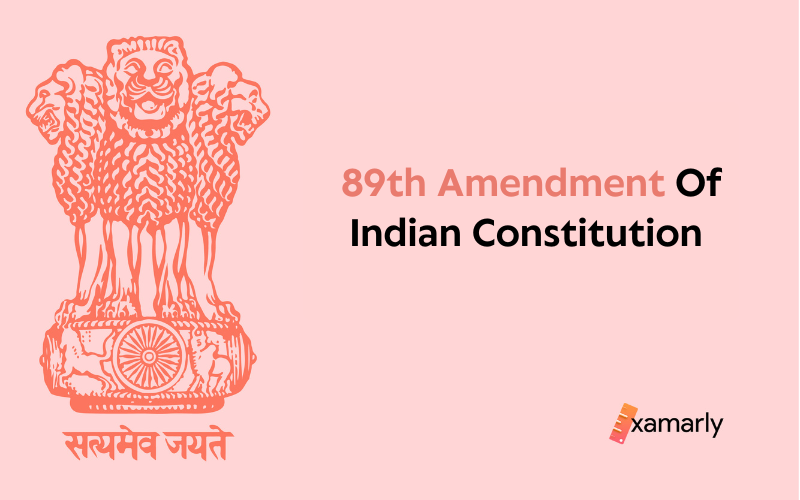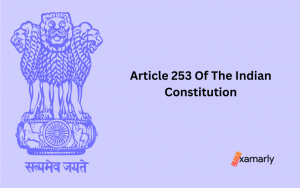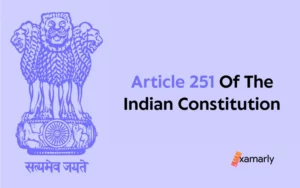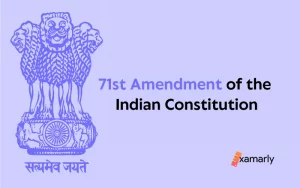The 89th Amendment of Indian Constitution created the National Commission for Scheduled Tribes, a constitutional authority. The Commission is a body that promotes the economic advancement of India’s Scheduled Tribes.
This article will give you a vivid picture of the 89th amendment of Indian Constitution. This article is beneficial for your UPSC Exam Preparation.
- 89th Amendment Of Indian Constitution
- Date Enacted
- Objects And Reasons
- Important Provisions
- What Is The National Commission For Scheduled Tribes?
- Functions Of The National Commission For Scheduled Tribes
- Composition Of National Commission For Scheduled Tribes
- Summing Up
- FAQs On 89th Amendment Of Indian Constitution
89th Amendment Of Indian Constitution
The 89th Amendment of the Indian Constitution provided for a separate body called the National Commission of Scheduled Tribes (NCST). It inserted a new Article 338A under Article 338, giving NCST constitutional status. The body works for the protection, welfare, and socio-economic development of the tribal communities.
Date Enacted
The 89th Amendment of Indian Constitution act was enacted on 19th February 2004.
Objects And Reasons
- The framers of the constitution were aware that some communities in the nation were socially, educationally, and economically backward due to the long-standing practice of untouchability, while others suffered because of primitive agricultural practices, lack of infrastructure, and geographical isolation. As a result, these communities required special consideration for protecting their interests and for their accelerated development. These groups were designated as Scheduled Castes and Scheduled Tribes following the requirements clause 1 of Articles 341 and 342 of the Indian Constitution respectively.
- The Constitution allowed for the appointment of a Special Officer under the original provisions of Article 338 to effectively administer the protections given to the SCs & other tribal communities. This special officer was known as Commissioner for SCs and STs.
- Thereafter, a non-statutory commission for SCs and STs was set up in the year 1978.
- Both these bodies i.e. The chief commissioner and the Commission for SCs and STs were performing the same functions but had different administrative authorities. To tackle this, the Central Government tried setting up a non-statutory National Commission for Scheduled Castes and Scheduled Tribes. Two amendment bills i.e. 46th and 51st were tabled and debated in the House of Parliament but none of them could gather the requisite votes in support.
- Both, the Commission for SCs and STs (non-statutory) and the office of Commissioner for SCs and STs continued to exist till the 65th Amendment Act was enacted.
- By the 65th Amendment Act, a statutory multi-member commission called National Commission for SCs and STs was set up. But, the legislators were aware that geographically, socially, and culturally, Scheduled Tribes’ requirements and issues were distinct from those of Scheduled Castes, necessitating a unique strategy to ensure their overall development.
- Bifurcation of the erstwhile commission was done in the year 2003 by the 89th Constitutional Amendment Act. Two distinct Commissions were made, one for each SCs and STs respectively. Later a third category of Other Backward classes (National Commission for Backward Classes) was added by the 102nd Amendment Act 2018.
Important Provisions
- Amendment of Article 338 was done and a new Article 338A was inserted.
- Provisions of modified Article 338 are as follows
- The marginal heading was changed and a new marginal heading was added, namely:- “National Commission for Scheduled Castes ”
- “Scheduled Tribes” as a term would be omitted from the sub-clauses.
- Provisions of Article 338A are as follows:
- Establishment of NCST
- Commission will be a multi-member body with a Chairperson, Vice-chairperson, and three other members. Their tenure of office will be determined by the President.
- Members will be appointed by the President of India.
- The Commission will have the authority to control how it operates.
- Duty of commission include the following:
- To monitor and investigate matters of safeguards provided to STs
- To inquire into complaints of deprivation of rights of STs
- To advise in favour of the Development of STs in the planning process of different programs
- To present an annual report before the President of India
- To work on the report recommendations
- To discharge other functions for the betterment of STs
- The President of India will present the reports before the Parliament or by the Governor before the State Legislative Assembly, as the case may be.
- The commission shall have the power of a civil court while investigating any matter.
What Is The National Commission For Scheduled Tribes?
This constitutional body serves the interests of the Indian tribes and works to protect their rights. In recent years, the NCST has taken on many important roles in the Indian government.
In its present role, the NCST investigates and monitors alleged violations of the fundamental rights and welfare of Scheduled Tribes. It is empowered to investigate complaints relating to the rights of STs and advise on socio-economic development.
The NCST functions from its headquarters in New Delhi, with regional offices in six States. Its four main functional units are socioeconomic development, educational development, service safeguards, and research. The Research Units deal with the atrocities that are committed against STs. Each unit is responsible for a specific issue.
Functions Of The National Commission For Scheduled Tribes
- The National Commission for Scheduled Tribes has several functions. It aims to ensure that the welfare of the Scheduled Tribes is facilitated in a sustainable manner. It is responsible for taking action on complaints with respect to atrocities against the Scheduled Tribes. The Commission also promotes social and economic development.
- The Commission also has the power to examine and summon anyone on oath. It can also advise the government on issues relating to the socioeconomic development of Scheduled Tribes. The Commission has the mandate to investigate complaints filed by Scheduled Tribes and act accordingly.
- In addition, the Commission has the responsibility of monitoring progress in the planning process of the Scheduled Tribes community. It also issues recommendations to the Union government and state governments. The recommendations it makes encourage the government to implement new and improve existing programs for the Scheduled Tribes.
- Providing rehabilitation and development of tribals displaced due to development projects.
- To provide maximum cooperation and rehabilitation measures to the people affected by the degradation of land. Their ownership rights and rights with respect to land cultivation should be looked after carefully. Social Afforestation as a practice should be preached.
- The Grant of development benefits and the impact of development schemes should be researched thoroughly.
Composition Of National Commission For Scheduled Tribes
- Article 338 of the Indian Constitution provided for the establishment of a National Commission for Scheduled Castes and Tribes. The Commission had a chairperson, a vice-chairperson, and five members. The President had the power to appoint all members. The Commission’s mandate was to develop economic policies for Scheduled Tribes in India.
- The first Commission was formed in 1978 and consisted of a chairperson and vice-chairperson. The second Commission was established in 1993, with H. Hanumanthappa and Dileep Singh Bhuria as its chairpersons.
- The National Commission for Scheduled Tribes is a constitutional body, created under Article 338-A of the Indian Constitution. Its main mandate is to improve living conditions for Scheduled Tribes, improve agricultural practices, and accelerate socioeconomic growth.
- At present, it is a multi-member constitutional body with a Chairperson, Vice-Chairperson, and other members appointed by the President.The tenure of office is three years. The Vice-Chairperson has the level of a Minister of State, the Chairperson has the rank of a Union Cabinet Minister, and the other members have the rank of a Secretary to the Government of India.
Summing Up
The National Commission for Scheduled Tribes has been a dysfunctional body for the last four years. It has yet to present any reports to the Indian Parliament. According to its website, the Commission had only four meetings in the financial year 2021-22. The resolution rate has hovered around 50 percent.
Strict regulations should be followed for increased efficacy of relief and for better socio-economic development of the tribal groups.
FAQs On 89th Amendment Of Indian Constitution
When Was The 89th Amendment Of Indian Constitution Introduced?
It was introduced on 28th September 2003.
When Was 89th CAA enacted?
It was enacted on 19th February 2004.
Who Introduced The 89th Amendment Of Indian Constitution?
It was drafted by Subhash C. Jain.
Who Was The First Chairperson Of NCST?
Kunwar Singh was the first Chairperson of NCST.






